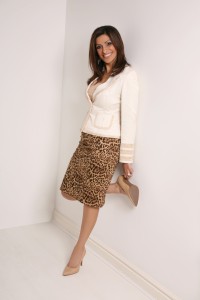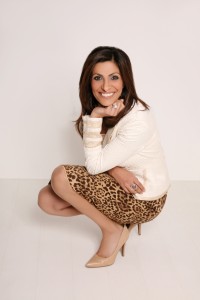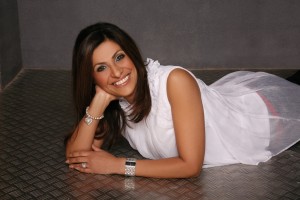Television news presenter Sameena Ali-Khan speaks to Pukaar Magazine’s Meera Majithia about the challenges she faces working in the media, how she juggles her demanding career with family life, and the disappointment she still feels about not being able to fulfil her life-long dream.
 She is arguably one of the most well known faces on television in the Midlands and has been at the forefront of delivering some major national stories since joining ITV as a presenter for Central Tonight. Though you may invite her into your homes every weekday evening, how much do you really know about the woman delivering your news?
She is arguably one of the most well known faces on television in the Midlands and has been at the forefront of delivering some major national stories since joining ITV as a presenter for Central Tonight. Though you may invite her into your homes every weekday evening, how much do you really know about the woman delivering your news?
Manchester-born Sameena Ali-Khan began her media career in March 1990 when she joined local commercial station Sunset Radio Manchester as a producer and presenter while studying at university. She said: “I just went for the hell of it to see what it was like and I then ended up going every Wednesday because in those days you had Wednesday afternoons off at university.
“I learnt how to drive a desk and play records and actually just control the whole system both on and off air. It gave me the break that I wouldn’t have got at a mainstream station and also gave me a taste for journalism.” Sameena then went on to do an MA in television features and documentary production at the University of Salford, Manchester.
This led her to her job as a researcher with Granada TV Manchester, before going on to work with Asian Sound Radio, BBC Northwest, BBC GMR and BBC Lancashire. In 2000 she took up the role of senior broadcast journalist at the BBC Asian Network and consequently went on to present the ‘Drive’ show. Taking up the job offer also meant she had to move to Birmingham, where she has since been living for the past 12 years. “I’ll always be grateful to the Asian Network because I think I got my break from that. It’s a great platform where you learn how to behave and act and get to grips with the wider BBC,” she added.
After presenting radio shows for BBC Radio 5 Live, BBC London and BBC WM and working as a freelance television reporter, she landed the role of main presenter with Central Tonight for the East Midlands in 2005. Commenting on her job Sameena said: “My role is to give people the news in what you would say is a warm, authoritative and entertaining way. ITV is slightly more entertainment based than the BBC so we probably do have a bit more fun, certainly towards the end of the programme.”
Some of her career highlights at ITV include attending a garden party at Buckingham Palace. “I got to wear a hat and everything which was something I’d never done before. It was a lovely day, hard work, but it’s great to be able to say I’ve been to Buckingham Palace and met the Queen,” she said. Other memorable incidents include interviewing the Duke of Edinburgh, presenting the Special Olympics and covering the Olympic Torch relay. Sameena said: “ITV has been superb, I’ve loved it. I had to grow up and learn a lot because to be fair I didn’t have a lot of experience when they took me on. But they took a risk and you just learn to grow.”
But with good also comes the bad. “Generally we give a lot of bad news and you have to have something outside of news in order to be able to cope with that,” Sameena added. “We’ve had some horrible stories which were sadly memorable for the wrong reasons. I still remember the Madeline McCann case, which is still ongoing. I found it quite hard to deal with because I think when you have a young child you do feel for the parents, no matter what the circumstances. It’s hard to try and switch off when you get home.”
The hard work she puts in has certainly not gone unnoticed. She’s scooped up a number of top awards over the years which include the CRE Best Radio News Programme (1998), Asian Arts and Cultural Society Media Professional of the Year (2004), KAPPA Awards Contribution to Media (2005) and RTS Best Onscreen Personality (2010).
Looking after a family and working full time is difficult for anyone, but it’s especially difficult when you’re working in the unpredictable world of media. “Media is not family friendly,” she said. “But the best thing I have got is my family and I think that helps me cope with the way I do things and makes me happy in life. I’m very blessed I’ve got good kids who understand mummy is on telly and mummy sometimes isn’t around. We have a nanny who helps us and she’s like the third parent.
“I think most working women struggle but you just do the best you can. You go to work some days feeling like you’re the worst parent in the world and other days you’re able to do things with them and you think this is what life is all about.”
Sameena’s taken both her 14-year-old son Dhanyal and her four-year-old daughter Sienna to the newsroom to let them have a go at trying out ‘mummy’s’ job. But she’s hoping they were put off and that one of them will fulfill her own life-long ambition of becoming a doctor. Having not achieved the required maths qualification at college, she had to abandon her dream of medicine and find a new career ladder to climb, a decision which still upsets her today.
She’s reached the highest level as a regional presenter and now has aspirations of working on national television one day. But her openness about the struggles of working in the media as both a woman and an ethnic minority is something to note. She said: “If I’m completely honest you’re always facing challenges. I don’t think many people would disagree with me if I said that media is generally biased. If you’re a woman you do have to fight hard and that’s just not within media but in life itself because we have things that come along like family and children and other responsibilities outside work. You’ve got to have a certain degree of determination and be prepared to get over those challenges.
 “As an ethnic minority it’s good and bad. You’re a rarity wherever you go and you can use that to your advantage. Equally, you’re a minority so you have to fight your corner and I think that is something you learn as you get on in your career.”
“As an ethnic minority it’s good and bad. You’re a rarity wherever you go and you can use that to your advantage. Equally, you’re a minority so you have to fight your corner and I think that is something you learn as you get on in your career.”
Another challenge Sameena faces along with her colleagues is the fast nature of news reporting. With the growing presence of online news, audiences want to get their news more immediately and this has forced a change in the structure of filmed news programmes. Whilst currently recording one-and-a-half programmes every day, ITV are moving towards recording two hours every day, which means longer hours working in the studio.
But when she’s not working she loves nothing more than spending time with her family, cooking, listening to music and learning to play a bit of piano herself. She has also co-written a novel for Mills and Boon with her husband, due to be published in the UK in April.



